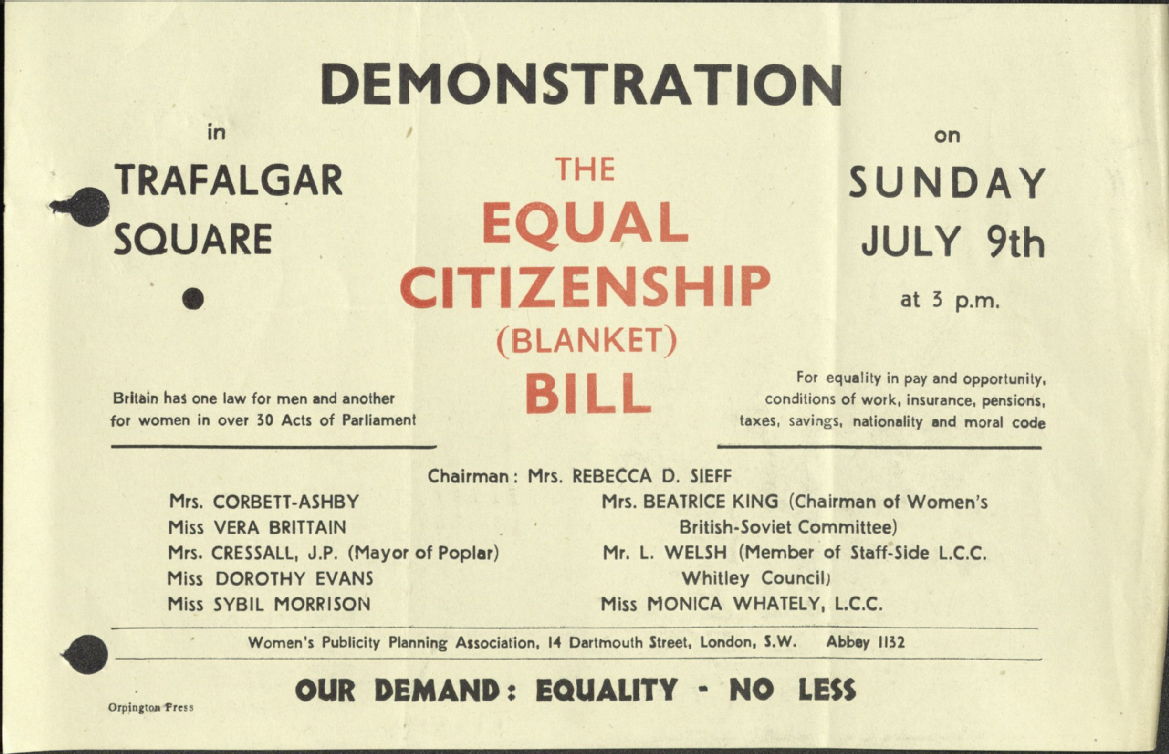‘There’s always been a women’s movement in Britain’? Assessing decline, impact and social change 1918-1945
Overview:
The Modern Records Centre holds a large amount of material on campaigns relating to economic and employment rights of women throughout the 20th century. This includes material relating to the campaigns for equal payLink opens in a new window from the 1910s onwards (particularly, initially, for teachers and civil servants) and promotional material produced by campaign groups such as the Open Door Council / Open Door InternationalLink opens in a new window, Six Point GroupLink opens in a new window, and the Women's Freedom LeagueLink opens in a new window.
= This symbol after a link means that it links to catalogue descriptions of the documents (including the reference numbers which will help you to order up the original documents at the MRC).
= This symbol after a link means that it links to digitised copies of the documents.
Selected sources:
Report of women veterans' causerie, 1938Link opens in a new window
Verbatim transcript of a discussion between five leading female activists in the trade union movement, reflecting on their experiences over the previous 50 years and discussing the changes that had taken place since the 1880s. The emphasis of the trade unionists is on improving conditions for women through economic organisation and agitation, with party political campaigning taking a secondary (though still important) role.
Party political leaflets aimed at women voters, 1918-1928Link opens in a new window
Six Labour Party and two Conservative Party leaflets. A pamphlet promoting 'What the Conservative Government has done for women and children, 1925-1928'Link opens in a new window is also available online.
'The Women of To-day', 1929Link opens in a new window
Small book produced by Margaret Pollock (also known as Mrs Dighton Pollock), a Labour Party activist, on the continuing fight for the "right to work on equal terms with men". It includes chapters on 'Women and freedom', 'Women and men', 'Women and the home', 'Women and work', 'Women and leisure' and 'Women and the vote'.
Leaflets on the Bastardy Bill, 1920Link opens in a new window
These leaflets were issued by the National Council for the Unmarried Mother and Her Child. They include a summary of the main points of the proposed legislation, answers to some objections, and an appeal to support the Bill.
Political rights, 1925-1943Link opens in a new window
Trades Union Congress file on political rights of women, including correspondence, minutes and ephemera relating to the Equal Political Rights Demonstration Committee, c.1926.
To our men comrades, c1928Link opens in a new window
Leaflet issued by the Workers' Birth Control Group. It uses the language of working class solidarity to appeal for men to help in their campaign to allow working women increased advice on and access to birth control, and compares the dangers of childbirth with those of mining. An outline of the aims of the Workers' Birth Control GroupLink opens in a new window is given in another leaflet of a similar date.
Transcript of BBC radio debate on the subject of equal pay for women, 1928Link opens in a new window
The debate was between Ellen Wilkinson, Labour Party politician and trade unionist, and W.H. Thoday, official of the London Schoolmasters' Association and a vocal opponent of equal pay.
'Women on the march', 1930Link opens in a new window
In the 1920s and 1930s a series of 'hunger marches' were organised (often in connection with the National Unemployed Workers' Union and Communist Party) to highlight poverty and unemployment amongst the working classes. This pamphlet by S. Elias, published by the Communist Party of Great Britain, explains the reasons behind a protest march by women from the north of England, Scotland and Wales. It highlights the low wages paid to women and the subsequent replacement of men with female workers to save costs.
Report of conference of the Abortion Law Reform Association, 1936Link opens in a new window
The Association believed that abortion was "a matter of health and well-being to be settled on scientific and commonsense grounds", rather than a moral wrong, and campaigned for changes in the law to allow women to have legal abortions performed by qualified medical practitioners.
Women's conference: Precis of discussion about BBC programmes, 1936Link opens in a new window
The conference was, in effect, the first BBC focus group. Female delegates from Britain and overseas (from a range of societies and campaign groups) gathered in London in April 1936 to tell the BBC what they wanted from the Corporation. Questions discussed included the timing and subjects of programmes for women - many delegates comment on the educational use of the BBC (there is also the occasional complaint about the 'low-brow' nature of some of the more popular programmes).
'Equal work deserves equal pay!', 1945Link opens in a new window
Illustrated pamphlet by Mavis Tate, Conservative Member of Parliament for Frome, published by the Equal Pay Campaign Committee. It summarises arguments in favour of equal pay for women.

Leaflet advertising a demonstration for the Equal Citizenship (Blanket) Bill, 1944, included in a Trades Union Congress file on 'Welfare and Rights Societies'Link opens in a new window.
